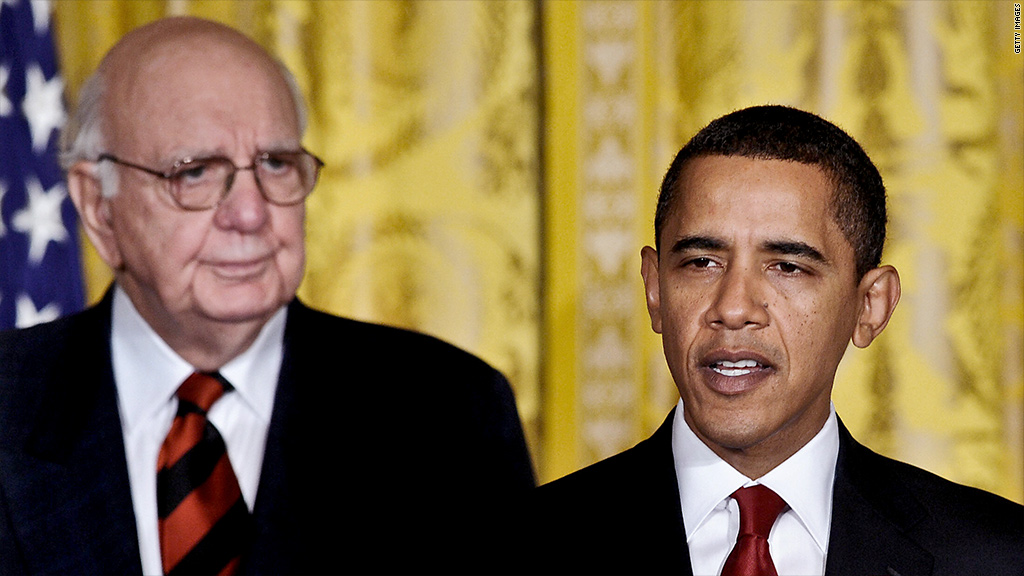
Banking regulators on Tuesday unveiled a central element of the sweeping 2010 reform law Congress passed in response to the financial crisis.
Known as the Volcker Rule, the provision introduces a variety of guidelines to limit risk-taking by banks with federally insured deposits. Five federal agencies approved the regulation on Tuesday.
Although the outline of the rule was set out in the Dodd-Frank financial reform law more than three years ago, financial executives, lobbyists and reform advocates have been anxiously awaiting the full text.
Named for former Fed chairman Paul Volcker, the rule harkens back to the Glass-Steagall Act, a Depression-era law that separated commercial and investment banking but was repealed by Congress in 1999.
Reform advocates say that with federally insured banks reined in, taxpayers won't be forced to bail them out in the future. Reformers reacted with cautious optimism to the text unveiled Tuesday, while industry representatives criticized it as overly complex and burdensome.
Ed Mierzwinski, consumer program director for the U.S. Public Interest Research Group, said the final rule was stronger than a previous draft version and "stronger than the rule that the banks wanted."
The rule restricts banks with federally insured deposits from engaging in risky investment activities undertaken for their own benefit, a practice known as proprietary trading, as well as from taking ownership stakes in hedge funds and private equity funds.
Related: Big bank stocks shrug off the Volcker Rule
Banks have called for the rule to protect "market making," in which firms hold securities to facilitate customer transactions. They also want to preserve their ability to trade for the purpose of hedging -- offsetting risks elsewhere.
There are exceptions for hedging and market making in the Volcker Rule. The key to the rule's impact will be how banks and regulators define those practices and how they're distinguished from proprietary trading.
Most major banks have already shut down their proprietary trading desks, which functioned like internal hedge funds. The problem is that even outside of proprietary trading desks, it can be difficult to tell when a trade is made for hedging or market making and when it's made for purely speculative purposes.
JPMorgan (JPM), for example, claimed its $6 billion "London whale" trading loss last year resulted from a hedge. But the failed trade, which drew on federally insured deposits, prompted fresh concerns about the industry's stability, and government officials have said it's exactly the kind of activity the Volcker rule will prevent.
The rule says that in order to demonstrate they are engaged in market making and not speculation, banks have to show their trades are based on "the reasonably expected near-term demands" of customers, taking into account current market conditions and historic demand.
Banks can still engage in proprietary trading of U.S. government, state and municipal bonds, as well as those of government-backed entities like housing finance firms Fannie Mae and Freddie Mac. They can trade in foreign bonds under more limited circumstances.
As for hedging, firms must point to "specific, identifiable risks" their hedging activities are intended to offset. That's a loss for Wall Street, which wanted the ability to define risks more broadly.
Bankers tasked with risk-mitigating hedging cannot be compensated in a way that rewards proprietary trading, the rule says.
Large firms are required to establish programs to ensure compliance with the directive, with CEOs certifying the existence of such efforts in writing.
Related: Will the Volcker Rule crush Goldman Sachs
The proposal has generated furious lobbying from advocacy groups and big-spending Wall Street firms over the past few years. Regulators have received over 18,000 comment letters on the subject, among the highest for any provision of Dodd-Frank. They have also held dozens of meetings with interested parties, the vast majority of which were affiliated with the financial industry, according to a recent paper from Duke University law professor Kimberly Krawiec.
Major banks are required to report data pursuant to the rule starting next year, with full compliance required by July 2015. The rule could be delayed further by lawsuits from the financial industry, as other aspects of Dodd-Frank have been.
"This provision of the Dodd-Frank Act has the important objective of limiting excessive risk taking by depository institutions and their affiliates," Federal Reserve chairman Ben Bernanke said Tuesday. "Getting to this vote has taken longer than we would have liked, but five agencies have had to work together to grapple with a large number of difficult issues and respond to extensive public comments."
Former Republican presidential candidate Tim Pawlenty, who now heads the Financial Services Roundtable lobbying group, said Tuesday that the rule "will reduce needed access to capital" and "stifle investments essential to growing jobs and small businesses."
But the rule drew praise from financial reform group Better Markets, which said it "will not end all gambling activities on Wall Street, but should limit them and reduce the risk to Main Street."
"Today's finalization of the Volcker Rule ban on proprietary trading is a major defeat for Wall Street and a direct attack on the high risk 'quick-buck' culture of Wall Street," Better Markets president Dennis Kelleher said.


